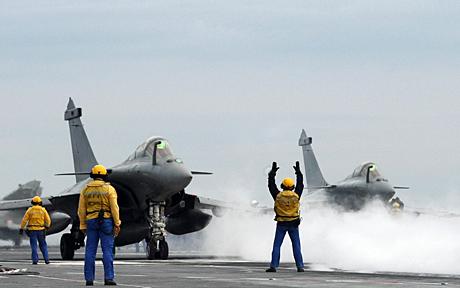
By Peter Solomon
The South China Sea contains the second busiest trading route in the world: the Straight of Malacca. Vital to meeting the energy demand of China, Japan, Taiwan, and South Korea, the supply flow through this region is comprised mainly of crude oil, liquefied natural gas, coal, and iron ore. On account of the territorial claim disputes that afflict the South China Sea, several militaries have been busy modernizing, namely China, the Philippines, and Malaysia. Overall, six nations claim partial or entire territorial rights over the South China Sea: China, the Philippines, Malaysia, Vietnam, Taiwan, and Brunei. What’s at stake in the region is more than trade routes – a 2006 estimate by the United States Energy Information Administration revealed proven reserves of 26.7 billion barrels of oil in the South China Sea (about the same quantity as Oman, Qatar, Syria, and Yemen’s oil reserves combined), and proven reserves of natural gas amounting to 7.9 trillion cubic meters (about the same quantity as Saudi Arabia or the United States’ reserves). Due to the considerable value of the oil and natural gas, the potential for disagreement is exceptionally high and, therefore, the possibility of conflict over territory in the South China Sea cannot be understated.
Due to the magnitude of trade and investment conducts the European Union (EU) with Japan and South Korea, and the great prospects for enhancing economic relations, the EU has a great stake in the security of East Asia. About 18.1% (251.5 bn. Euros) of the EU’s exports are destined for East Asia, while a mere 3.3% go to other destinations in Asia. Additionally, the EU imports about 30.1% (452 bn. Euros) of its goods from East Asia compared to just 4.2% for the rest of Asia. It is easy to see that a good deal of the EU’s economic health depends upon trade with East Asia. Therefore, a key EU foreign policy security goal is to promote peace and stability in East Asia.
China is in the process of modernizing its People’s Liberation Army Navy (PLAN) to exert Chinese influence in the region. It is no secret that China is building up its power projection capabilities to counter-balance the presence of the United States defense forces in the Western Pacific. Due to Japan and South Korea’s geographic location and security ties, any conflict or disruption to stability in the South China Sea could have major impacts on East Asia. The EU’s concern, however, is in regards to Europe’s economic stake in the region and the EU’s identity as a normative power. Despite the EU’s promotion of peace and stability in East Asia, the institution’s lack of credible power projection capabilities in the region belie the EU’s ability to intervene in security issues in the region.
Although an EU-led military operation would be unlikely in the Western Pacific, the importance of the region would compel individual nations to act to maintain law and order, or to preserve maritime safety, safeguarding their commercial interests in the region. In the event of a conflict it is entirely possible that EU member states would engage the region through the North Atlantic Treaty Alliance (NATO). Recent counter-piracy operations off the coast of Africa have set a precedent for maritime military action far from the traditional European area of operations. Additionally, Great Britain and France can still act on their own if it is in their best interests as both maintain competent navies with power projection capabilities, including the ability to deploy their own aircraft carriers.
In the case of a South China Sea conflict, Japan would be most certainly directly involved as its tankers transport 70% of Japan’s oil through this region. A confrontation would force Japan’s oil tankers to circumvent a conflict in the South China Sea by navigating around Indonesia into the Pacific Ocean. However, this option would be both expensive and laborious. Additionally, two-thirds of South Korean natural gas is shipped through the South China Sea on its way to the Korean peninsula. In regards to the European Union’s economic interests in East Asia, maritime security is crucial for Europe.
Currently, EU military capabilities consist of 13 battlegroups, which are “rapid response units” that consist of 1,500 troops each. EU member states rotate the responsibility of provisioning these units, two of which have always been on stand by since 2007. However, this force has never been deployed and it is difficult to say how the debt crisis will affect the EU’s research and development into new military capabilities. Given the budget cuts and focus on internal issues, the EU will likely continue to place the burden on the United States to maintain the status quo in the Western Pacific region. In the event of a crisis in the South China Sea, it would be the effects on the EU’s East Asian trading partners that would create the most potential to draw in the maritime forces of individual EU member states.
Whether or not the EU will cooperate in joint military expeditions with Japan or South Korea in the future is unknown. With regard to economics, EU-Japan and EU-South Korea economic ties are substantial, and significant cooperation in both relationships has led to the emergence of global economic partnerships via Free Trade Agreements with both nations. Through Japan and South Korea, the EU has established a gateway into East Asia’s vast markets and developed a role as a player in security issues, albeit a minimal role for the time being. Despite the EU’s current internal focus it cannot forget about its strategic partnership with Japan and South Korea.
This post is from our British partners at TheRiskyShift.com and can be found in its original form here.
Peter Solomon is a Master of Arts in International Political Economy candidate at King’s College London. Peter earned a bachelors degree from the University of Connecticut in English and Political Science.


One thought on “No South EU Sea”